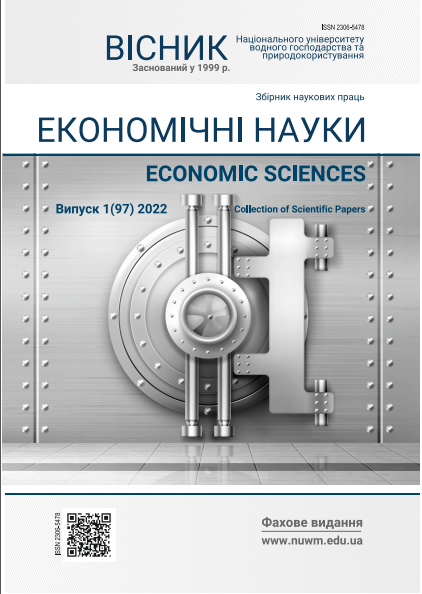COST ACCOUNT SIGNIFICANCE FOR ECONOMIC EFFICIENCY IMPROVING OF THE FUNDAMENTAL LOCAL SELF-GOVERNMENT UNITS
DOI:
https://doi.org/10.31713/ve1202210Keywords:
public, local government units, information systems, cost accounting, compulsory reporting, treasurers.Abstract
The article is devoted to rationality and effectiveness of spending public funds by local government units in order to implement tasks assigned to them is currently strongly emphasized. Nowadays in practice local government units focus primarily on spending public funds in accordance with the law and meeting reporting obligations in this regard. In order to achieve this goal, an analysis of the literature on the subject and legal acts was used. Empirical research was also carried out in the communes of the subregions of Siedlce and Ostrołęka. They were aimed at learning opinions of commune heads, treasurers and secretaries on the importance of cost accounting in increasing the effectiveness of unit operations that they manage. Our research confirms that cost accounting is a necessary element of the economic information system in any economic unit. The existing cost accounting models are subordinated to specific information needs for economic entities stakeholders. At the same time, they meet information needs arising from various decision-making situations. The research reveals some interesting details, such as: in 36 communes of the Ostrołęka and subregions of Siedlce, both the generic and calculation method of costs are used; no audited entity uses only a cost-based system of costs; only 35% of the surveyed communes use multi-sectional cost records. It also proves that a small number of respondents are aware of the information capacity for records. The surveyed communes measure the budget implementation degree by measuring and analyzing actual costs and revenues (93%). 57% of basic local selfgovernment units use calculations of the unit cost of production. Remaining units both do not use and do not want to implement such a tool. The paper emphasizes that efficiency is the basis of each organizational unit, so the basic local governments should consider the desire to continuously improve all activities efficiency as a necessary condition for development. It is necessary to look for new solutions in this area, in particular – to rationally use cost accounting. This is undoubtedly the most important area of modern management accounting. Business units, including basic local governments, must take into account costs arising from actions that are taken in order to cope with the competition. Therefore, costs should be recognized both retrospectively and prospectively. The proposals proposed in the work will efficiently increase cost accounting in the activities of local governments. Out of 32 surveyed local government units that use activity-based costing, only 4 use the spreadsheet system for cost accounting. Remaining communes use only the generic system. The willingness to implement this cost accounting in 4 audited entities should be assessed positively. It can be used not only in the tasks calculation, but also in determining real costs of services provided by municipalities. The considerations carried out above indicate that surveyed entities make little use of methods and tools that increase the efficiency of the budget funds use.References
Buchanan J. M., Tullock G. The Calculus of Conset: Logical Foudation of Constitutional Democracy. Liberty Fund, Indianapolis. 2004.
Burzym, E. Pomiar i ocena rentowności przedsiębiorstw przemysłowych. Warszawa, 1971.
Charnes A., Cooper W. W., Rhodes E. Measuring the efficiency of decision making units. European Journal of Operational Research. 1978. Vol. 120.
Cooper R. Target costing, communication to CAM-I. Europen Research Group. 1992.
Cooper R., Kaplan R. Zarządzanie kosztami i efektywnością. Oficyna Wydawnicza, Kraków, 2000.
Kachniarz M. Pomiar efektywności usług publicznych – zarys koncepcji i spodziewanych rezultatów. Prace Naukowe Uniwersytetu Ekonomicznego we Wrocławiu. 2013. Nr 284, 41–49.
Kożuch A. J. Rachunek kosztów jako instrument zapewniający sprawne zaspokojenie potrzeb publicznych w JST. Optimum, Studia Ekonomiczne. 2013. Nr 1 (61), 93–105.
Nowak E. Rachunek kosztów przedsiębiorstwa. Ekspert, Wrocław, 2009.
Nowak E. Rachunek kosztów a zarządzanie kosztami. Rozważania o relacjach. Studia Ekonomiczne, Zeszyty Naukowe Uniwersytetu Ekonomicznego w Katowicach. 2015. Nr 245, 162–172.
Nowak E. Rachunek kosztów w jednostkach prowadzących działalność gospodarczą. Expert, Wrocław, 2018.
Owsiak S. Budżet władz lokalnych. PWN, Warszawa, 2008.
Pomorska A. Główne uwarunkowania procesu racjonalizacji wydatków. [w:] 2007.
Prewysz-Kwinto P. Rachunek kosztów docelowych. CeDeWu, Warszawa.
Rokita S. Modelowanie rachunku kosztów w na potrzeby zarządzania w gminie. Prace Naukowe Uniwersytetu Ekonomicznego we Wrocławiu. 2018. Nr 506, 124–134. URL: http://dx.doi.org/10.15611/pn.2018.506.12 (data zvernennia: 11.01.2022).
Sadowska B. Rachunek kosztów działań – Teoria i praktyka. Prace Naukowe Uniwersytetu Ekonomicznego we Wrocławiu. 2015. Nr 398, 420–431. URL: http://dx.doi.org/10.15611/pn.2015.398.40. ((data zvernennia: 11.01.2022).
Skica T. Efektywność działania jednostek samorządu terytorialnego. Prace Naukowe Uniwersytetu Ekonomicznego we Wrocławiu. 2012. Nr 271, 306–316.
Sołtys D. Rachunek kosztów. Wydawnictwo Akademii Ekonomicznej we Wrocławiu. Wrocław, 1999.
Stiglitz J. E. Ekonomia sektora publicznego. Wydawnictwo Naukowe PWN. Warszawa, 2004.
Szewczuk A. Relatywizm w ocenie zjawisk ekonomicznych, organizacyjnych i społecznych mających wpływ na racjonalizację wydatków publicznych, [w:] Głuchowski J. 2007.
Wakuła M. Koszty w procesie zarzadzania jednostka samorządu
terytorialnego. Zeszyty Naukowe Uniwersytetu Szczecińskiego. Nr 765, Finanse, Rynki Finansowe, Ubezpieczenia. 2013. Nr 61 t. 2, 355–363.
Walczak M., Kowalczyk M. Rachunkowość i budżetowanie w zarządzaniu finansami gminy. Difin. 2010.

